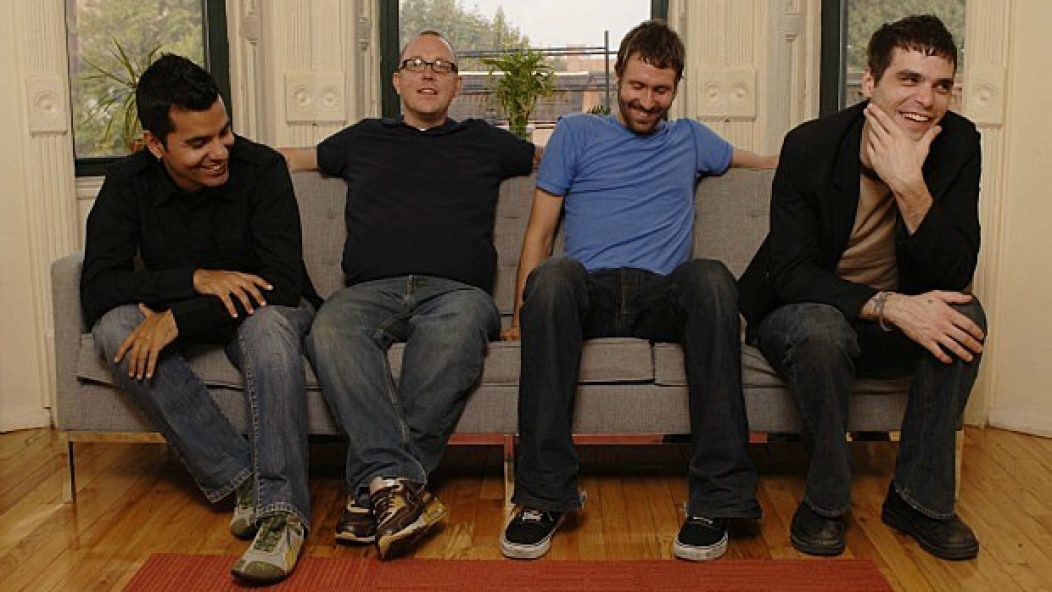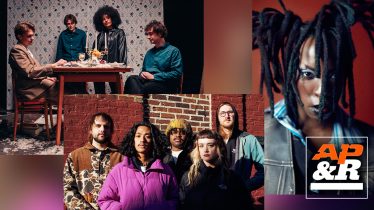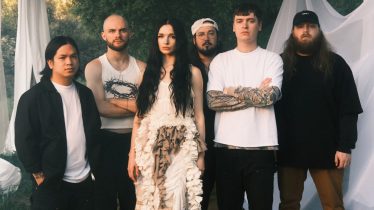
Exclusive Interview: Texas Is The Reason's Norman Brannon on the band reuniting
TEXAS IS THE REASON were one of the brightest lights in ’90s punk, winning over thousands thanks to their churning, chugging, aching post-hardcore that even got them courted by major labels. But then, just like that, it was over, after only a few short years of productivity and barely more than a dozen songs to their name. The band—vocalist/guitarist Garret Klahn, guitarist Norman Brannon, bassist Scott Winegard and drummer Chris Daly—briefly reunited in 2006 for a pair of shows celebrating the 10th anniversary of their sole full-length, Do You Know Who You Are?, before receding back into the shadows. That is, until now: Texas Is The Reason are reuniting once more, in celebration of Relevation Records’ 25th anniversary celebration October 11 at Irving Plaza in New York City (tickets for which go on sale at 1 p.m. on Friday, July 13). We caught up with Brannon to get the scoop.
INTERVIEW: Scott Heisel
PHOTO CREDIT: Jordan Provost
What can you tell us about this reunion show?
NORMAN BRANNON: Well, the first thing we need to talk about, definitely, is that the show is October 11 in New York City at Irving Plaza with Underdog, Shades Apart, Gameface and On The Might Of Princes. It’s part of Revelation’s 25th anniversary festival, which they just finished doing a version of in California a couple months back. They actually asked us to play this, I think, before even the California shows happened. I think the original answer was “no,” and I think after the shows happened and after kind of thinking about it a little bit more, there was a little bit of reassessment on our part in terms of something that seems bigger than us in a lot of ways and that I think has something to do with the idea that we would actually get together and do it.
Revelation, obviously at one point in our lives, especially as young people before we were even on the label in the ‘80s—I mean, this is what we collected before our baseball cards. We loved Revelation Records, but more than that I was thinking about how personally, I’ve gotten rid of [most of] my vinyl over the years. There are a couple things that I have kept and as far as hardcore records go, I actually only own one, and it’s the New York City Hardcore: The Way It Is compilation, which I bought when it came out, I think in 1987 or ’88, and there was something about that copy when I look at it still, it makes me feel like I’m a part of something. And, to me, that was very crucial in my life, and I think anybody in our band would probably say the same thing. So, being a part of this festival became I guess more important and we kind of reassessed it, and we decided that it would be something that was worth playing.
So how long ago did you actually agree to do the show?
We talked about it and agreed on it the day before Revelation first put out a teaser, which I think was something like two weeks ago or something. So, it literally just happened really fast, You know, one minute, it wasn’t happening, then we said, “Okay,” and the next morning, people sort of knew. There was no official announcement or anything like that, but people started talking and it just became reality.
Obviously, as many people know, you guys reunited originally about six years ago for two shows in New York. Looking at the social media landscape between 2006 and 2012 is drastically different. There wasn’t Twitter six years ago. The way news spreads now is so viral and instant from person to person. So, was it a shock then when people started coming to you right away and asking about this even though there had been no formal statement?
I think that it’s interesting for us as a band because we still say things like, for example, we don’t like to talk amongst each other in email. It’s generally a bad idea for our band to talk to each other in email. It just doesn’t end well. And we found that it’s always better for us to get into a room together and talk and be a band and not an internet chat group. So, I think that it may have something to do with the fact that honestly, when we broke up, we were just at that level where we had an email address. Forget about the internet.
Was it, like, [email protected] or something?
[Laughs.] It was [email protected]. So, we had that maybe for the last month of our band, so you know coming around in 2006 and again now when everything is much more sophisticated and established, I think the biggest fun for us was just to get that sort of instant communication with people that you can’t have through a press release. Me, personally I think with our Twitter account, I think it’s really fun to engage with people and to talk to people and to have little jokes. 10 minutes ago, I noticed that Graham Elliot the chef tweeted about us. He called us one of the best ever, and I was like, “Wow! I totally love you on Top Chef: Masters!” So, those types of things are really—they’re just fun, and they couldn’t have happened before, so it’s nice to see the fans in a new dimension, and it’s nice to see how we can adapt to these new dimensions.
The way you’re talking about it, it seems like the band sounds like a living, breathing entity, and obviously, when you did the shows six years ago, there was kind of a big hubbub made about how that was going to be it—that you never got to have your final send-off. That was your way to kind of put the band to bed, but now you’re revisiting it again. Do you feel, at some point, that it’s desecrating a corpse, or do you feel like this is going to be something that keeps happening. Are you trying to keep the ball rolling?
I will say this: I’ve never really been one for the whole idea of the legacy. I kind of feel like that’s not important. I think that we’re addicted to kind of rock ’n’ roll mythology, so we have these kind of concepts of bands and their legacies and who kept the legacy strong and who ruined the legacy with that comeback album or something. My feeling has always been that if you’re a band and you own it, you own it. You can do whatever you want with it. You can put out a comeback album if you wanted to. I’m not saying we’re going to, but I’m saying, like, if that’s your decision and that’s what makes you happy, you own it. It’s your decision. You should do that. And I can opt not to buy it, but I don’t think that you’re doing anything to sort of desecrate a corpse, right?
That said, I think that back then we were in a different circumstance, which was a very specific circumstance of our lives where I think everybody in the band was kind of in a place where we were all sort of new at second or third careers, even. Kind of like enjoying our 30s and being like, “Okay. What else can I do now?” For me, I can say that I decided to go back to school, so there was nothing about being in a band that seemed to gel with that. Scott was establishing a career as a chef. Chris is a hairstylist. We all kind of had these careers that we started, and it just didn’t seem practical to kind of lend any false hope that we would do a tour or something like that, but now we’re all a little more—we’re established now. I teach college now. When we played those shows in 2006, I hadn’t even stepped into an undergrad class. Somehow, in the interim, I’ve done that. It also says something about how long it’s actually been. It seems like it wasn’t that long ago, but it actually was.
So, I feel like with all of us really, with those shows, I think there was a sense that we just needed some closure for ourselves. With this, I think it’s like… You can keep the door closed, but eventually, if people are still knocking, you’re going to get up and answer it. It almost feels inevitable. So, at least, from my perspective, it seems that at this point, we’re willing to at least leave the door ajar.
You’re not supposed to do that in New York City. Your landlord will yell at you.
[Laughs.] Someone might very well break in.
Continued on page two…
Obviously, Scott, Chris and Garrett have all remained pretty heavily involved in music over the past decade plus. But you’ve kind of been the one person that really hasn’t done much in the way of creating music since you were playing with Jonah Matranga for a little bit a decade ago. Is it fair to label you as the one hold-out for this band? That you’re the one that kind of has to agree to do it before it can happen? Or is it kind of a communal thing?
No. This band has always been a 100 percent democracy, and it’s always been a situation, too, where we know who this band is. We could never do this band with anybody else, so the fact that it hinges on these four people at all times means something to how we can approach anything to do with it. So, sometimes it’s better for me than others, and sometimes it’s better for Scott than others, and sometimes it[‘s better for Garrett than others, but as far as my quote-unquote “career” in music, it’s not like I’m stubbornly not playing in a band or something like that, but I did get a little bit of clarity in the last few weeks of doing this and thinking about it in the sense that I really feel like these four people in this combination of members in a band or whatever, I’ve never felt the same way about playing in a band since, and I’ve never felt the same way about playing in a band before we got together.
I actually pulled out a letter the other day, and I may post it on Twitter if Garrett will let me… Garrett wrote me a letter after our first practice on this typewriter that he got—it was obviously 1994, writing to each other on a typewriter—he wrote me this letter and was just thinking about how there was something to it. We wrote that first 7-inch pretty much the way you hear it in, like, one 10-hour day. I remember coming home from that practice with the tape and listening to it and being like, “This band is real.” I’ve never felt that before and I’ve never felt it again, and it‘s just a thing with us four for some reason. When you put us in a room together, it made sense, and it still makes sense. It’s a shame that it’s also such a wild experience. I think that as far as the four of us are concerned, I mean, we’ve never left each other’s lives, and so we’ve been at each other’s weddings and birthday parties and just hanging out and, you know, whatever. I kind of feel like this band is just going to outlive us all.
So, with that said, do you want to create more music with the band if it felt right? I know you played a couple “new” songs six years ago that you had worked on for the follow-up to Do You Know Who You Are?, and I was always surprised that after you played those, you didn’t record those. Even for like a quick, one-off digital EP or a benefit 7-inch or something like that. It just seemed like there was too much talent there to not document it. So do you see yourselves doing anything with that new material or even coming up with more new material?
I can be perfectly honest with you: We actually did plan on recording those songs, and scheduling conflicts screwed up the date that we had planned to do it. And, again, it’s just we have these really complicated lives right now, so it’s not like we can just drop everything and be like, “Okay. We’re going to this place for a week.” So we’ve thought about it once before and got far enough in the process of thinking about recording those songs before actually realizing we couldn’t that I wouldn’t say it’s impossible for those songs to get recorded at some point, but I think right now for our band… Historically, I think it’s better for us to not plan so far into the future, because we definitely… I just feel like we operate better when we just have one thing set in our sights at a time, and everything just seems to flow smoother that way. So, I think it’s great to be in a position now where we feel like, “Okay. We can just kind of leave this door ajar,” and we don’t have to kind of create this situation where we’re just putting our foot down and saying “no.” But, at the same time, I think we’re probably a little shy to leave the door wide open, too. I think that’s understandable.
Absolutely. So looking toward the show, what do you think will be different for this show than for the original reunion shows? How do you think it will change at all?
One of the main things that I think is different is the vibe. First of all, these shows [in 2006] were completely ours, right? Everything was on our heads, and we pretty much did everything for those shows just completely were in total control of what happened. We had even done things, like, we hired a lighting designer. We really, like, went for it, and it was because when we broke up, I feel like we never really had a chance to really enjoy that peak, and in 2006, it just happened that the peak got bigger. So, we just thought, “Let’s enjoy it. Put the money back into production. Let’s make a real concert.”
I feel like we’re going into this show specifically with a lot more light-hearted feeling: a very much like “let’s have fun” feeling. Not that that wasn’t there last time, but I feel like this time, there’s really an interesting celebration, because it’s not completely about us, and we can kind of play with that a little bit. And we’re still kind of talking about exactly how we’re going to approach this show. You know, what kind of special things we can do, but we haven’t really nailed it down yet.
At this point, it seems like virtually everyone and their mother has gotten back together to make one more go of it—
We started it! [Laughs.]
So, who’s left? Who do you want to see get back together that has not done it yet?
The Promise Ring just played New York, we hung out, saw them. Christie Front Drive played here this year. We were really happy to see them. That was great, but the one band from that era that we were friends with that I personally love and would pretty much love to see again, just fly anywhere to see, is definitely Mineral. And I don’t think that will ever happen.
Well, you know what: People thought you guys would never do that again, let alone do it twice, so the door is always ajar, as you said.
They were just one of these bands that I felt [were like us]. They just kind of broke up after they made this really great album. I get it. I relate to them. I want them [to reunite].
I will say this about reunions, and I think that this is kind of my rule of thumb and it’s also, on some level, my guarantee of quality: I very much feel like if you’re going to do a reunion, you need to be at least X many years as good as you were the last time you played. With Refused, for example, I just saw those guys play, and the last time I saw Refused was in 1998 in Stockholm, and I remember watching them a couple months ago, and saying they’re definitely 14 years better than the last time I saw them and then some. So I definitely feel like I would never, ever, ever play a show with this band unless I felt that we were going to be at least six years better than we were in 2006. It’s absolutely important to me to do everything right. Not for the sake of a legacy or some sort of rock ’n’ roll mythology, but just personal pride. It’s something I love.








